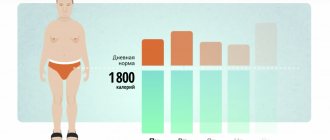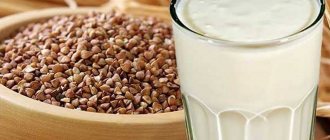Have you been on a strict diet for so long that you can’t remember exactly when you started? Have you cut your calorie intake to a minimum to overcome the plateau effect? If you answered “yes” to at least one of the two questions listed, then most likely you need to do a loading day.
Is it necessary to do a loading day in a diet when losing weight?
Have you been on a strict diet for so long that you can’t remember exactly when you started? Have you cut your calorie intake to a minimum to overcome the plateau effect? If you answered “yes” to at least one of the two questions listed, then most likely you need to do a loading day.
If you have experience losing weight, then you've probably experienced a plateau effect or even a slight weight gain. This body reaction usually occurs after several weeks or months of dieting.
Weight loss may slow down every week until the scale needle freezes in place. Reason and science at times like these say we should move forward with a calorie deficit to speed up our goal.
However, science also suggests temporarily “fooling” our body, which has just adapted to a calorie deficit diet.
Why does weight loss stop?
The diet minimizes leptin, triiodothyronine (T3) and thyroxine (T4) levels while increasing cortisol levels. Leptin suppresses hunger, T3 and T4 increase basal metabolic rate, and cortisol increases blood sugar and accelerates protein breakdown.
The human body, in the process of evolution, has learned to preserve fat deposits through the loss of muscle mass. The trick is to reverse these negative processes by tricking your body into thinking you are no longer calorie restricted.
What is a loading day?
A loading day is a special part of the carbohydrate cycling strategy. Instead of high carb days, medium carb days, and low carb days, you have normal carb days and loading days.
By increasing your carbohydrate intake, you increase leptin levels and energy expenditure. With increased consumption of carbohydrates, the release of the hormone insulin into the blood increases, which is useful as a substance that suppresses the breakdown of protein in muscles, as well as stimulating the production of testosterone (in men).
Loading days are especially important for women because if leptin levels are not high enough, menstruation may stop. That is, loading helps maintain longevity and health.
The frequency of loading days and the percentage of excess carbohydrates consumed on these days depend on many factors:
- Duration of the diet;
- Level of calorie and carbohydrate deficit;
- Body fat percentage;
- Genetics;
- Physical activity.
Typically, the more you limit your carbohydrate intake on diet days, the more carbohydrates you need to consume on loading days.
Increasing your fat intake on a fasting day interferes with the rise in leptin levels.
The benefits of loading days
Loading days will make the difficult struggle with excess weight easier. Staying in a caloric deficit for long periods of time is exhausting (even though it helps you live longer).
Sometimes increasing your daily calories, especially from carbohydrates, can:
1. Reduce hunger! Not only due to the consumption of more food, but also due to an increase in the level of leptin - the “satiety hormone”.
2. Increase energy expenditure despite the calorie deficit. Our body reduces energy expenditure when reducing energy intake. Increasing your carbohydrate intake from time to time will help increase your energy expenditure even when following a long-term diet.
3. Make Dieting Easier: It's much easier to stay in a calorie deficit if you know you can eat more on certain days. This approach to losing weight is much more effective in helping to avoid breakdowns and gluttony. It also allows (if urgently needed) to enjoy consuming your favorite product/dish.
4. Liven up your diet with more carbohydrates, making it more tolerable.
5. Avoid a breakdown: it is difficult to maintain a calorie deficit for a long time. Almost the entire period of following a diet during “drying” a person experiences stress. Therefore, breakdowns very often occur: as soon as the goal of the diet is achieved, the person begins to eat everything. Loading days will make the exit from the diet smoother, without breakdowns.
6. Increase energy consumption and labor productivity. Rapid fat burning occurs with the loss of a small percentage of muscle. You need to constantly fight for their safety and strive for their growth while following a diet. Increased consumption of carbohydrates, which occurs rarely but periodically, allows you to replenish glycogen in the muscles, and therefore preserve muscle tissue.
Why might the method not work?
Well, you ate a lot, sit, wait for the result, and instead of losing weight, you have a couple of extra pounds and a bad mood. What is the reason? To avoid such troubles, follow the rules of cheating.
- Don’t go to great lengths – everything should be tasty in moderation. As soon as you remember the taste of long-forgotten sweets and baked goods, you may “blow your mind”, after which you will begin to absorb everything that comes into your field of vision. A few days of permissiveness will spoil you, and you will not be able to return to your usual routine. To prevent this from happening, always control yourself - even on days of “gluttony”;
- Watch your excess weight - if you deceive your body for just a day or two, then you can easily afford to increase your daily intake by 1500-2000 kcal, which means that you can afford absolutely everything! If you decide to extend the holiday by 3-4 days, then the limits of what is allowed will have to be tightened - only plus 400 kcal, which, you know, won’t go much faster;
- The more you eat, the more liquid you need to consume in order to easily digest everything you eat;
- No one is talking about every girl – don’t overeat at night. Unless, of course, you want to wake up with a swollen face, a bad mood and a heaviness in your stomach;
- Pamper yourself once a week and no longer than 25-48 hours. The optimal time is one and a half days;
- The most strong-willed can try to completely eliminate instant carbohydrates and focus on proteins;
- You will have to forget about coffee and alcohol - this will increase the load on the heart and kidneys.
If used correctly, you can achieve good results, namely: speed up metabolic processes, lose more than usual and stop overeating on normal days.
To be even more convincing, here are reviews from girls who were helped by cheating to lose weight:
Anya, 20 years old:
Hello everyone! I love sweets very much, so any diet is like torture for me. Once a week I take a day off and eat whatever my heart desires. In just a few weeks of this regime, I not only did not gain weight, but also lost five kilograms.
Alexandra, 32 years old:
Hello! As a mother of two children, I often have to visit cafes and prepare sweets. Of course, sometimes it’s simply impossible to resist! Therefore, from time to time I arrange a “belly celebration”, and on the second day I go on a diet. So far, my weight loss has not suffered a bit from this, but my mood has improved significantly!
What is cheating?
Cheat meals and cheat days should be considered a specific type of loading. Cheating is also about consuming more calories, but with psychological benefits.
Eating a hamburger, fries, and ice cream (especially if you eat it last) can make you very happy. But do not forget that cheat meals and loading days have completely different meanings from the point of view of physiological benefits. After all, the ratio of macroelements (proteins, fats, carbohydrates) in them is fundamentally different.
Serving sizes
Most people on long-term diets with limited calories and small portions look forward to cheating, thinking that they will be able to have a gastronomic feast that day. But even on this day, you should remember that the amount of junk food has volume limits.
Increased calories do not mean larger portion sizes. It remains the same as during the diet, the calorie content itself simply increases. When cheating, you cannot make a larger portion, because during a diet the stomach gradually gets used to a smaller volume of food, begins to narrow, and a person eats up less food without experiencing severe hunger.
If you increase the usual portion during loading, this will primarily affect your well-being. You will feel a feeling of heaviness in your stomach and may feel nauseous. Increasing the portion size during the day will cause the stomach to stretch, and the next day, when the diet is resumed and you have to return to smaller portions, the person may experience severe bouts of hunger, which can lead to a breakdown.
Are there other approaches to carb and calorie cycling?
There are several other approaches to calorie cycling. Some of them, such as the traditional one, are similar to downloading. Others are based on completely opposite principles.
For example, consume the physiological norm of calories all week and make 1-2 days low-calorie. The approach is based on a principle similar to loading, which makes the diet more bearable, because there are “fed” breaks between “hungry” days. But hormone levels differ and affect body changes differently.
This approach works flawlessly even taking into account the adaptive metabolic mechanism.
Reviews
Marina, 32 years old, Odessa : I found out about cheating by accident. I doubted for a long time whether it was worth carrying out, because I was afraid of breaking down. My diet lasted for 1.5 months, and the weight began to gradually stop. Having decided to cheat, I was satisfied. I can’t say that I greatly increased my choice of foods, I just ate more meat and cereals that day. Cheating helped, and the next day I returned to the diet with the same zeal with which I started it. I noticed that the weight began to come off again. I liked this technique and will continue to use it in the future.
Olga, 28 years old, Kemerovo : My day ended in failure: I couldn’t resist and just started eating everything. I believe that you need to prepare for cheating no less than for the diet itself. I don’t know how others hold on after loading and find the strength to return to a diet after they could eat a forbidden product. I couldn't, but I want to try again.
Irina, 38 years old, Moscow : Cheating helps, I’ve seen it from my own experience. After 1 such day, the weight comes off again quickly, as in the beginning. But for me there is one big drawback to such a day: first, I force myself to eat more calories for a long time, and then it also takes me a long time to find the strength to go back to the diet. But the idea of loading is good, it’s simple and here you need to have a lot of willpower.
What's the point?
The human body easily adapts to any diet, as a result of which weight loss slows down. Loading will help speed up your weight loss process again by temporarily increasing your carbohydrate intake. This approach will make the diet easier and livelier, making it more bearable and ensuring a smooth transition to a higher calorie diet at the end of the diet due to the absence of excessive hunger and food cravings.
If loading negatively affects any of the factors described above, it may not be worth using. But the cumulative effect of loading days makes the method a very powerful fat burning tool.
Research on the effects of loading is limited and difficult to generalize, and there are many approaches to application. Loading can be used successfully by increasing carbohydrate intake by either 50% or 100%. You can also reduce/increase the amount of fat consumed, depending on metabolism and the body’s response to diet changes.
How often should I have a loading day?
Pampering yourself once a week won't work. Cheating is carried out 2 times a month (1 day every 2 weeks). At the beginning of a long diet (if you skip the first month), cheating should not be done more often than once every 30 days. In the future, provided that there is regular physical activity, and its intensity gradually increases, cheating can be done more often - once every 10 days. If the previous loads went without complications, the person did not experience moral and physical discomfort when returning to the diet, cheating can be done once a week.
There are several types of cheating depending on the duration:
- 1 day, but you can extend the loading period to 1.5.
- Rarely – 2 days. If cheating is observed for 48 hours, you need to divide the recommended amount of calories into 2 days. The disadvantage of a 2-day loading is that after such a long relaxation, returning to the diet can be even more difficult.
The number of days directly depends on the characteristics and nature of the diet. So, for example, if you choose a strict diet lasting from 10 days to 2 weeks, up to 3 cheatings lasting 1 day (maximum 1.5) are allowed during this period, depending on the selected number of calories.
If the diet lasts from 1 to 3 months, cheating is carried out weekly, its duration is from 1 to 1.5 days, and the calorie content of the diet should be increased by no more than 800-1100 kcal.
There are especially long-term diets, lasting up to 5 months. Their peculiarity is that the weight will be frozen quite often, so the metabolic process must be stimulated by carrying out a loading day. For particularly long-term diets, cheating should be done every 5 days. In this case, caloric content should increase per day from 400 to 600 kcal.











